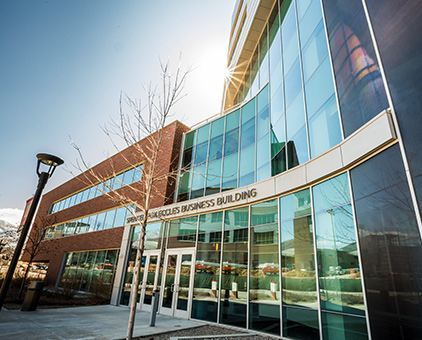Geoscience
Emphases: Geophysics
Bennion
Center
Capstones
Program
Hinckley
Institute
Learning Abroad
109
Declared
Majors
Courses
Getting Started
- Meet with your academic advisor to create a first year course plan
- Take GEO 1100 and GEO 2500 in the fall
- Take an appropriate math course (check with your advisor)
Making Progress
- Take GEO 2100
- Continue with your allied science sequence (check with your advisor)
- Study in the Student Epicenter (FASB 104)
- Find professors on www.earth.utah.edu and set up an appointment to talk about research
- Take a general education class that feels interesting (GEO 3030 is a great IR class!)
- Begin taking upper division electives to explore the earth sciences
Finishing Up
- Meet with your academic advisor to review your degree audit
- Prepare to take Field Methods and Field Geology or Undergraduate Research as your capstone experience
- Apply for graduation during your final fall semester
Community
Getting Started
- Visit student involvement tables in the fall (find more information in the Student Epicenter - FASB 104)
- Check social media links and calendar of events
Making Progress
- Apply to be a student ambassador (ask your advisor for details)
- Volunteer to help with outreach workshops and building tours (visit the Student Epicenter for details)
- Find a student club or organization at getinvolved.utah.edu
- Experience an alternative fall or spring break through the Bennion Center
Finishing Up
- Join GeoClub and get involved with the annual Open House, the weekly Distinguished Lectures Series, or sit on the department outreach committee (email gg-info@lists.utah.edu)
Knowledge & Skills
Getting Started
- Meet with a Career Coach at careers.utah.edu
- Interview or job shadow with someone in your field of interest (connect with a Geology professor at earth.utah.edu)
Making Progress
- Attend the STEM Job Fair in the fall to find internships, see CPDC calendar
- Find a learning abroad experience
- Research professional licensure requirements for geological engineering at aegweb.org
- Consider taking GEOG 3100 – Intro to GIS & Cartography
- Join a research team. Connect with your current professors or find research interests on the website
Finishing Up
- Share your research with the Office of Undergraduate Research
- Present your research at the annual department Open House (email gg-info@lists.utah.edu)
Transformation
Getting Started
- Use the Catalog to explore a minor or certificate
- Visit with a Student Success Advocate
- Explore the Natural History Museum of Utah - free for students!
Making Progress
- Begin research for a senior thesis and work with a professor studying hydrology (earth.utah.edu)
- Volunteer at the Seismograph Station, contact webmaster@seis.utah.edu
- Explore the Earth’s movement in and around Utah at quake.utah.edu
- Visit one of Utahs national parks
- Listen to the movement of the arches
Finishing Up
- Participate in graduation events across campus (look out for advisor emails with details)
- Interview a Distinguished Lecture Series presenter (find schedule here)
Impact
Getting Started
- Join Inclusive Earth (student club information in the Student Epicenter FASB 104)
- Attend a MUSE Casual Friday (visit MUSE website for events calendar)
Making Progress
- Participate in or create your own community service project at the Bennion Center
- Volunteer at the Gardens on campus
- Find volunteer opportunities at geology.utah.gov
Finishing Up
- Teach community members about your interests at the annual Open House (watch for emails from your advisor)
- Share your research in the department newsletter (email advisor)
Careers
Getting Started
- Start building your resume with your career coach
- Activate and customize your Handshake account to find jobs, internships, and career events
Making Progress
- Create a LinkedIn Account
- Research internships through the Hinckley Institute
- Start research with a faculty member
- Apply for research funding through UROP
- Ask your advisor or professors about Learning Abroad experiences for earth scientists
- Attend Career Expos in fall and spring semesters, visit careers.utah.edu
Finishing Up
- Apply for jobs or graduate schools at least 6 months before graduation (check with your advisor for details)
- Meet with a Career Coach to practice interview conversations
Start Your Career Journey
Find support at the Career and Professional Development Center (CPDC)
About the Major
Learning Outcomes
- Understand the nature and origin of the materials that make up the Earth
- Understand the dynamic processes that operate within the Earth from its deep interior to the surface
- Apply basic principles of mathematics, chemistry, biology and physics to geologic issues
- Recognize the professional and ethical responsibilities expected of scientists
- Demonstrate skills in reading comprehension of scientific literature, and in oral and written communication of scientific results
- Demonstrate proficiency in geologic field skills and in solving integrative, field-based problems in Earth science
Plan & Prepare
At the U, we plan for our students to have an exceptional Educational Experience identified by four broad categories we call the Learning Framework: Community, Knowledge & Skills, Transformation, and Impact. This major map will help you envision, explore, design, and plan your personalized Exceptional Education Experience with the Learning Framework at the core. In addition to assisting you in planning your coursework and navigating the requirements of your major, this map will help you incorporate other kinds of experiences to expand your knowledge, support your development, and prepare you for the future you want.


